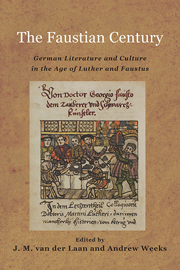Book contents
- Frontmatter
- Contents
- List of Illustrations
- Acknowledgments
- Introduction: Faust Scholarship and the Project at Hand
- 1 The German Faustian Century
- 2 Faustus of the Sixteenth Century: His Life, Legend, and Myth
- 3 Cornelius Agrippa's Double Presence in the Faustian Century
- 4 Converging Magical Legends: Faustus, Paracelsus, and Trithemius
- 5 Faust from Cipher to Sign and Pious to Profane
- 6 The Aesthetics of the 1587 Spies Historia von D. Johann Fausten
- 7 The Lutheran Faust: Repentance in the Augsburg Confession and the German Faustbuch
- 8 Marriage in the Historia von D. Johann Fausten (1587)
- 9 Antiauthoritarianism and the Problem of Knowledge in the Faustbuch
- 10 Exploring the “Three-Fold World”: Faust as Alchemist, Astrologer, and Magician
- 11 The Devil in the Early Modern World and in Sixteenth-Century German Devil Literature
- 12 Encounters with “Schwarz-Hans”: Jacob Böhme and the Literature of the Devil in the Sixteenth Century
- 13 D. Johann Faust and the Cannibals: Geographic Horizons in the Sixteenth Century
- A Sixteenth-Century Chronology of Significant References to Faust with Parallel World Events
- Select Bibliography
- Notes on the Contributors
- Index
2 - Faustus of the Sixteenth Century: His Life, Legend, and Myth
Published online by Cambridge University Press: 05 May 2013
- Frontmatter
- Contents
- List of Illustrations
- Acknowledgments
- Introduction: Faust Scholarship and the Project at Hand
- 1 The German Faustian Century
- 2 Faustus of the Sixteenth Century: His Life, Legend, and Myth
- 3 Cornelius Agrippa's Double Presence in the Faustian Century
- 4 Converging Magical Legends: Faustus, Paracelsus, and Trithemius
- 5 Faust from Cipher to Sign and Pious to Profane
- 6 The Aesthetics of the 1587 Spies Historia von D. Johann Fausten
- 7 The Lutheran Faust: Repentance in the Augsburg Confession and the German Faustbuch
- 8 Marriage in the Historia von D. Johann Fausten (1587)
- 9 Antiauthoritarianism and the Problem of Knowledge in the Faustbuch
- 10 Exploring the “Three-Fold World”: Faust as Alchemist, Astrologer, and Magician
- 11 The Devil in the Early Modern World and in Sixteenth-Century German Devil Literature
- 12 Encounters with “Schwarz-Hans”: Jacob Böhme and the Literature of the Devil in the Sixteenth Century
- 13 D. Johann Faust and the Cannibals: Geographic Horizons in the Sixteenth Century
- A Sixteenth-Century Chronology of Significant References to Faust with Parallel World Events
- Select Bibliography
- Notes on the Contributors
- Index
Summary
Only a few reliable sources corroborate the identity of the historical Faustus, the person behind the legend. Faustus was an astrologer, but he also gained a reputation for dabbling in magic. Renaissance magic seemed to be a magnet, which possessed an extraordinary power to draw into its orbit a whole range of associations. Many feared magic as a dangerous adventure of curiosity into the realm of the devil. Faustus's bold claims in these areas made him sensational, provocative, and, in his lifetime, admired at certain times, condemned at others. The condemnation of Faustian curiosity in combination with the devil pact, which took on a menacing shape as a result of the witch persecution craze, set the stage for the rapid transformation of history into legend, myth, and literature. The entire process took place within the sixteenth century.
Reliable sources cite the birth of the historical Faustus (first name: Georg, Georgius, or Jörg) in Helmstadt near Heidelberg, in about 1466. Karl Schottenloher has shown that he used the name Georg Helmstetter at first. This young man began his studies at the University of Heidelberg in 1483. He quickly gained academic degrees as a bachelor in 1484 and as a master (magister) of philosophy in 1487. At the age of about twenty-one, the required age for the master's degree, he accomplished what was in his time a major academic achievement. He was proud to call himself magister, philosopher, and doctor.
- Type
- Chapter
- Information
- The Faustian CenturyGerman Literature and Culture in the Age of Luther and Faustus, pp. 43 - 66Publisher: Boydell & BrewerPrint publication year: 2013



